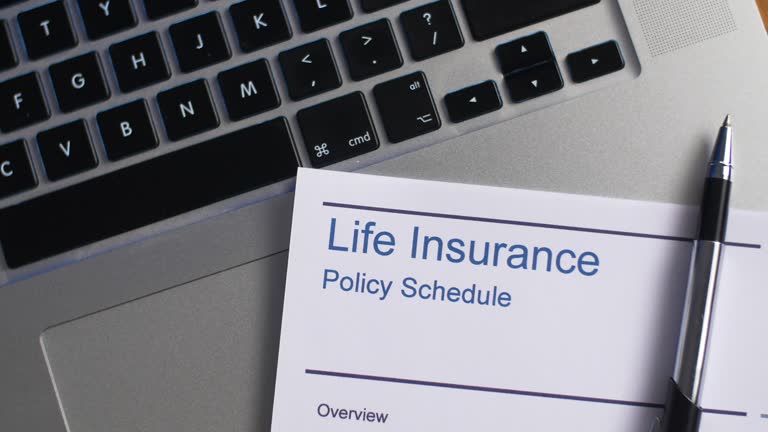Introduction: Insurance and Financial Planning
Life insurance is a good strategy that can improve your financial stability. Insurance, which is considered a necessary expense for most people, is actually a fundamental part of your financial planning. With this, you can ensure financial security for yourself and your family, which is a better strategy for the future. Insurance not only protects you from an immediate financial risk, but is also part of a comprehensive financial plan that can improve your life.
Types of insurance and their financial Planning

There are different types of insurance, including life insurance, health insurance, and property insurance. Each type has a specific role to play in financial planning. Life insurance ensures your family’s financial stability if you agree to an obligation. Health insurance covers medical emergencies and eases the financial burden. Property insurance protects your property against natural calamities and accidents. All kinds of in its familiarity which gives you long-term stability.
Life Insurance: Family protection and financial security.
Life insurance provides financial security to your family, which is an essential part of financial stability. If something unexpected happens to you, life insurance provides your family with a financial cushion. It is difficult for you to meet their daily expenses, education, and other financial needs. After all, life insurance ensures the long-term stability of your family and gives you peace of mind.
Health Insurance: Medical Emergencies and Financial Protection

Health insurance acts as a financial shield for medical emergencies. A health insurance policy protects you from unexpected hospital bills, treatment, and drug costs. By this, you need and can afford health care, for financial stress. Health insurance also encourages you to have regular check-ups and preventive care, which is essential for your overall health and well-being.
Property Insurance: Protection and stability of your property
Property insurance protects your physical assets, which are an essential part of your financial well-being. Your policy protects you against property loss, damage, and theft. Property insurance protects your home and its contents, which is a financial investment. This gives you a financial safety net to maintain your financial stability in case of unexpected events.
Investment Policies: Growth and protection of your investment
Investment policies like endowment plans and unit-linked insurance plans (ULIPs) also increase your investment. These policies provide you with savings and investment opportunities as well as insurance coverage. This way you can achieve your long-term financial goals, such as retirement planning or children’s education. The role of investment policies is to provide growth and protection in your financial portfolio.
Retirement Planning: Insurance and Retirement Strategies

Retirement planning is an essential aspect of financial literacy, and insurance plays an important role. After retirement your regular sources of income may end, so life insurance and investment policies provide you with a steady stream of income. This way you can make your retirement period stress-free and financially secure. Insurance plans for retirement provide you with a structured savings and investment strategy.
Tax Benefits: Insurance policies and tax savings
You can also get tax benefits through insurance policies. Your tax deductions on life insurance and investment policies work out your overall tax liability. Deduction of life insurance premium under Section 80C of the Income Tax Act is a good part of your tax planning. An additional financial benefit is found in such financial humanisation of yours.
Emergency fund and insurance relationship
An emergency fund is an essential financial cushion that prepares you for unexpected expenses. Insurance policies and an emergency fund both increase your financial stability. Insurance gives you long-term financial security, while an emergency fund handles short-term financial emergencies. By combining the two, you can make your financial planning comprehensive and flexible.
Estate Planning: Insurance and Wealth Transfer.
Estate planning allows you to transfer your assets efficiently, and insurance makes the process easier. Life insurance policies provide liquidity to your estate, which helps in wealth transfer and inheritance planning. This way you can easily transfer your assets to the next generation without any financial hiccups. The combination of estate planning and insurance is to ensure your financial legacy.
Insurance cost and budget
Managing the cost of insurance policies is also important. For this, you need to analyze your budget and fit the insurance premium into your overall financial plan. Paying premiums on a regular basis is important, but you have to manage it to align with your budget and savings plan. Balancing budgeting and insurance costs, you want to maintain your financial stability.
Alignment of insurance and financial goals
It is important to align insurance policies with your financial goals. Insurance policies should be integrated with your long-term financial planning so that you can effectively achieve your goals. This increases your financial security and helps you achieve your financial goals. Aligning insurance and financial goals gives you a clear road map.
Choosing and comparing insurance policies
Choosing and comparing insurance policies is also important. There are different policies available in the market that offer different features and benefits. You should choose the best policy according to your financial needs and goals. By comparing policies, you can get the best coverage and value for money. It has to manage your finances effectively.
Future trends and innovations in insurance
New trends and innovations are also being seen in the insurance industry. Advances like digital insurance platforms, customized policies, and better coverage options can improve your financial literacy. Updated with future trends, you may want to modernize your insurance policies and make your financial planning more efficient.
Conclusion: An integrated approach to insurance and finance Mansoor Abadi
Finally, an integrated approach to insurance and financial empowerment enhances your financial stability and security. It is important to align insurance policies with your financial plan, achieve your goals, and follow the latest trends. How, you can secure your and your family’s financial future. Insurance is an essential tool that can make your financial management comprehensive and flexible.



